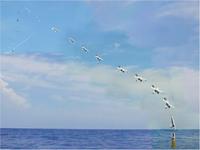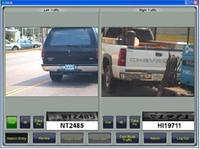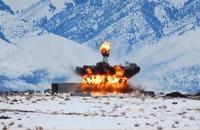-
One percent of Swedish criminals commit 63 percent of all violent crimes
The majority of all violent crime in Sweden is committed by a small number of people. Researchers have examined the case of all the people who were brought up on charges of violent crimes in Sweden between 1973 and 2004 – 2.5 million people in all. Of the 2.5 million individuals included in the study, 4 percent were convicted of at least one violent crime — 93,642 individuals in total. Of these convicted at least once, 26 percent were re-convicted three or more times, thus resulting in 1 percent of the population (23,342 individuals) accounting for 63 percent of all violent crime convictions during the study period.
-
-
Texas terror case may hinge on reason for a FISA warrant
The Foreign Intelligence Surveillance Act (FISA), passed in 1978, was the center of a Fifth Circuit Court of Appeals trial last Thursday in New Orleans. The case involves Khalid Ali-M Aldawsari, a former Texas Tech student serving a life sentence for an attempted use of a weapon of mass destruction. At trial, federal prosecutors described Aldawsari as a “lone wolf” terrorist planning to wage a personal “holy war” from Lubbock, Texas. In the application for the warrants, however, prosecutors identified Aldawsari to a FISA court judge as an “agent of a foreign power.”
-
-
DoD sound protection standards for secret spaces are insufficient
What is the best place to conduct a conversation about a confidential or even classified matter? Surprisingly, probably not a conference room designed in accordance with acoustical criteria approved by the Department of Defense (DOD). While such “secret” rooms — intended to keep sensitive information out of the earshot of unauthorized listeners — might meet DOD standards, they offer less protection against snooping than is found in a luxury condo.
-
-
Is the time finally right for a pan-African security force?
Representatives of fifty-three African states, meeting at an African summit in Paris last week, emphasized the need for a pan-African military force. Observers note that this is not a new idea – it was first raised Ghana’s first president Kwame Nkrumah in 1963 — but that on those few occasions when efforts were made to translate the idea into reality, it has never worked. Notwithstanding the many failures of the past, and the many warning signs of the present, many African leaders and observers are optimistic that this time, the 50-year old dream of a pan-African military force may well be realized.
-
-
UN approves intervention in Central African Republic as violence rages

The UN Security Council yesterday voted for a resolution, put forward by France, which authorized an African Union-led peacekeeping force to intervene in the Central African Republic to prevent the growing chaos from causing the state to disintegrate. The AU force, with the support of French forces, will protect civilians, restore humanitarian access, and stabilize the country. UN officials have warned that the violence between the Christian majority and Muslim minority now in power could lead to genocide.
-
-
U.S. Navy demonstrates UAV launch from submerged submarine

The U.S. Naval Research Laboratory (NRL) demonstrated the launch of an all-electric, fuel cell-powered, unmanned aerial system (UAS) from a submerged submarine. The successful submerged launch of a remotely deployed UAS offers a pathway to providing mission critical intelligence, surveillance, and reconnaissance (ISR) capabilities to the U.S. Navy’s submarine force.
-
-
Seventeen teams to compete in DARPA Robotics Challenge Trials

Four teams that built full robot hardware and software systems using their own funds qualified to join thirteen other teams to compete in the Defense Advanced Research Projects Agency (DARPA) Robotics Challenge (DRC) Trials. The event will take place 20-21 December at the Homestead-Miami Speedway in Homestead, Florida, where spectators can observe as the robots are tested on the capabilities that would enable them to provide assistance in future natural and man-made disasters.
-
-
Standardized performance tests for emergency response robots
Seventeen teams will be directing their emergency-response robots to perform eight basic tasks which were drawn from the Fukushima Daiichi response and then converted into standardized tests by researchers at the National Institute of Standards and Technology (NIST). A year later, the capabilities of robots that qualify in this year’s trials will be tested in a more realistic disaster scenario. In the winner-take-all finals, robots will perform all eight challenges consecutively. NIST engineers have been at the forefront of using standardized performance testing for emergency response robots used in bomb-response and for urban search-and-rescue operations. Since 2005, fifteen NIST tests have been adopted as standards by ASTM International, and about forty more are under various stages of development or review.
-
-
Earthquake early warning? There’s an app for that
Researchers from the University of California have unveiled a smartphone app designed to provide users an early warning of approaching earthquakes. Based on the proximity of the user to the earthquake’s epicenter, the app will provide alerts of between a few seconds and one minute before a tremor hits.
-
-
Better earthquake early-warning system
Geophysicists have developed a new way of calculating the magnitude of an imminent earthquake by making better use of measurements of the compression waves produced early in the event. They say that the technique could be used to create a better early-warning system for earthquakes that could be used worldwide.
-
-
Y-12 security breach update: Old nun awaits sentencing while costs of new Y-12 facility not to be released until 2015
On 28 July 2012, three senior citizens, led by an 83-year old nun, easily breached the supposedly impregnable security systems protecting the Y-12 National Security Complex at Oak Ridge, Tennessee. The three peace activists wondered the grounds of the maximum security facility for a while before being noticed by security personnel. While the three aging protesters are awaiting sentencing, the two companies — Bechtel Corporation and Babcock and Wilcox – which were responsible for designing and implementing security at Y-12, have been named as the primary construction contractors for planning and design of the new uranium processing facility (UPF) to be built at Y-12.
-
-
France reasserting its role as Africa's indispensable power
In March this year, rebel militias, many composed of Muslim fighters from Chad and Sudan, overthrew the government, a move which has resulted in spreading lawlessness among rival warlords, with the risk of the disintegration of the country and sectarian war spilling beyond the country’s borders distinct possibilities. As was the case in Mali earlier this year, France has decided to put its foot down, sending hundreds of troops to the capital Bangui to restore order and restrain the lawless rebels. “The challenge of this intervention [in the Central African Republic],” on analyst wrote, “lies in the ‘return’ of France to the dark continent after decades of interference followed by a period of relative indifference or misstatements. If France succeeds in its Central African mission, it will have recovered a good part of its influence, positioning itself as an indispensable partner in those places where it risked becoming a vague memory.”
-
-
More states move to limit LPR use
Law-enforcement units across the United States have been using license plate readers (LPRs) to monitor vehicles on public roads in order to locate missing individuals, investigate murderers, or track hit-and-run drivers. Privacy advocates are concerned with the wholesale storage of license plate information, and the fact that some municipalities have no limits on how long plate numbers can be stored. LPRs proponents are worried that the recent revelations about the NSA surveillance programs make it difficult for LPRs and other law-enforcement technology to get a fair hearing.
-
-
Wisconsin legislature considering restriction on LPRs

State legislators in Wisconsin have proposed a law to limit the use of license plate readers, drawing criticism from local law enforcement. Republican state Representative David Craig, the sponsor of the proposed legislation, said: “The vast majority of [the LPR] images are becoming nothing more than a database of the whereabouts of average citizens. The time has come to ensure the civil rights of citizens are not being violated, while also ensuring law enforcement has the tools needed to effectively enforce our state’s laws.”
-
-
Testing explosives capability helping armor research

In modern warfare, military vehicles use enormous armored panels to defend against weapons. Boosting protection by adding more steel, however, eventually makes equipment too heavy to use. There are other ways to defend against a weapon besides trying to stop it with just mass — smarter, more economic ways that are waiting to be discovered.
-
More headlines
The long view
Factories First: Winning the Drone War Before It Starts
Wars are won by factories before they are won on the battlefield,Martin C. Feldmann writes, noting that the United States lacks the manufacturing depth for the coming drone age. Rectifying this situation “will take far more than procurement tweaks,” Feldmann writes. “It demands a national-level, wartime-scale industrial mobilization.”
How Male Grievance Fuels Radicalization and Extremist Violence
Social extremism is evolving in reach and form. While traditional racial supremacy ideologies remain, contemporary movements are now often fueled by something more personal and emotionally resonant: male grievance.
The Surprising Reasons Floods and Other Disasters Are Deadlier at Night
It’s not just that it’s dark and people are asleep. Urban sprawl, confirmation bias, and other factors can play a role.
Why Flash Flood Warnings Will Continue to Go Unheeded
Experts say local education and community support are key to conveying risk.
